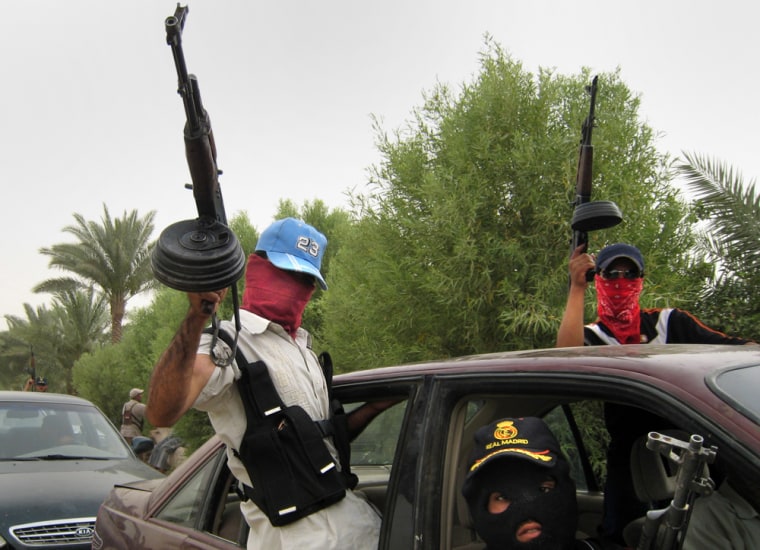The U.S. tactic of using armed Sunni tribesmen in the fight against al-Qaida in Iraq offers short-term gains to weaken the insurgency, but could set the stage for a full-scale sectarian civil war when the Americans begin to draw down their forces.
The danger that these alliances of convenience could backfire becomes all the greater if Iraq’s Shiite, Sunni and Kurdish leaders fail to achieve genuine political reconciliation — the key to ending the conflict.
Instead, signs point to further polarization, despite some progress hammering out deals on sharing the oil wealth and returning many former Saddam Hussein loyalists to government jobs. Parliament could take up the oil bill as early as Wednesday.
“If anything, the use of Sunni tribes in the West has created new forms of Sunni versus Shiite polarization,” former Pentagon analyst Anthony Cordesman told a House committee last week.
Nevertheless, U.S. military officials insist the strategy is working to quell the violence, especially in Anbar province. The western desert region — threaded by the Euphrates River — had been largely written off as a haven for insurgents. But major Sunni tribal leaders agreed to come together to fight al-Qaida in Iraq late last year.
Since then, al-Qaida in Iraq has been mostly driven out of Anbar’s main population centers, according to Marine Brig. Gen. John Allen, the deputy commander for U.S. forces in western Iraq. Those include longtime trouble spots such as Ramadi, Haditha and Fallujah that had been the major strongholds of the Sunni insurgency.
Encouraged by the shift in Anbar, U.S. commanders have sought to replicate the model in Diyala province northwest of Baghdad — the scene of an ongoing offensive to regain control of the provincial capital of Baqouba.
Breakaway members of the 1920 Revolution Brigade, an insurgent group led by former Saddam backers, serve as scouts and intelligence gatherers, identifying al-Qaida hideouts.
“They are tired of al Qaida and the influence of al Qaida in their tribes and in their neighborhoods,” Maj. Gen. Joseph Fil, the U.S. commander for Baghdad, told reporters last week. “And they want them cleaned out and they want to form an alliance in order to rid themselves of this blight.”
'Changing the direction'
U.S. officials insist they aren’t actually arming the Sunni tribesmen but simply utilizing them. Nearly every household in Iraq has at least one weapon and the country is awash in guns.
“We’ve given them a little ammo, some flares, but mostly humanitarian aid. We’re not arming these guys, we’re just changing the direction they’re pointing their guns in,” Lt. Gen. Raymond Odierno, the U.S. ground forces commander, said last month.
Regardless of where the weapons come from, the risk is that the Sunni tribesmen won’t cooperate with the Shiite-led central government if they succeed in crushing their al-Qaida rivals. The effort could end up simply creating new Sunni militias, further undermining the authority of an already weak central government.
In rural areas, tribal loyalty is often stronger than allegiance to the national government, especially when the central administration is weak.
“There’s no question that the people with guns in Iraq are looking after their own self-interest,” said Jon Alterman, a Mideast expert at the Center for Strategic and International Studies in Washington. “And they don’t have any sentimental attachment to the central government in Baghdad.”
Mindful of that risk, the Shiite government’s initial reaction to arming Sunnis in Anbar and elsewhere was cool. Last month, Prime Minister Nouri al-Maliki said arming Sunnis was simply creating new militias.
Later, al-Maliki said his remarks were misunderstood and that the program should be carried out “under the supervision of Iraqi authorities and through the government.”
'No effective middleman'
But the effort to arm the Sunnis grew in part out of U.S. frustration with Iraqi officials, notably in the Shiite-led Interior Ministry.
U.S. officers had complained privately that they had found Sunnis willing to join but the Shiites at the ministry in Baghdad would not authorize the slots.
“We’ve been forced to go beyond the central government because the central government’s reach doesn’t extend much beyond the Green Zone, and local police are often extensions of militias in any event,” Alterman said. “We’ve been forced to cut out the middleman because there’s no effective middleman to be had.”
The success of the program will likely depend on whether the Iraqis make progress in reaching power sharing agreements among the Shiite, Sunni and Kurdish communities. That would reinforce a sense of national cohesion — which the country now lacks.
'Serving as the bridge'
Prospects for lasting agreements appear uncertain. The main Sunni political bloc has refused to attend Cabinet meetings to protest an arrest warrant against a colleague. Muqtada al-Sadr’s Shiite faction has also suspended its participation in government.
Those issues would have to be resolved before meaningful agreements can be struck.
Frederick Kagan, a former West Point professor and senior analyst at the American Enterprise Institute, acknowledges that the Americans and Iraqis must be careful to ensure that the Sunnis are eventually integrated into the security forces.
But Kagan believes the gamble is worth it.
“We are serving as the bridge between the Sunni insurgents and tribal leaders and the Shia government,” Kagan wrote in The Weekly Standard. “Before the end of last year, there were virtually no Sunnis willing to step on that bridge. Now, five months into the surge, tens of thousands are walking on it.”
